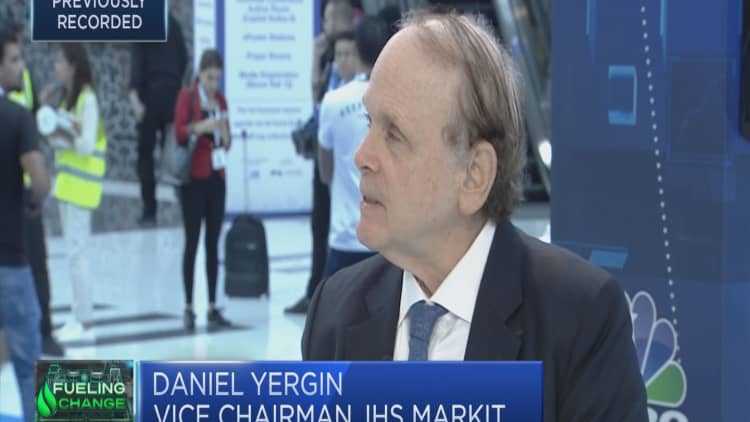President Donald Trump on Monday tweeted that he hopes OPEC does not cut oil output, the same day Saudi Arabia's energy minister said the cartel and its allies may need to throttle back production by about 1 million barrels per day.
"Hopefully, Saudi Arabia and OPEC will not be cutting oil production. Oil prices should be much lower based on supply!" he wrote on Twitter.
The tweet marks Trump's latest attempt to influence OPEC policy on Twitter. The president has tweeted at the 15-nation producer group several times this year, blaming it for rising oil prices and ordering its members to take steps to tamp down the cost of crude.
Trump's latest broadside comes on the heels of a sharp pullback in oil prices that has seen U.S. crude plunge into a bear market and post its longest losing streak on record. Prices tumbled over the last five weeks as global equity markets sold off, crude supplies rose and the outlook for growth in oil demand weakened.
The sudden drop in oil prices from four-year highs just last month has forced OPEC and a group of crude exporters including Russia to rethink how they are managing the market.
On Sunday, a committee representing the group said oil supply is growing faster than demand, suggesting the alliance may have to launch a fresh round of production cuts. The same day, Saudi Energy Minister Khalid al Falih said the kingdom's oil shipments would fall by 500,000 bpd in December.
On Monday, Falih told an oil conference in Abu Dhabi that technical analysis suggests "there will need to be a reduction of supply from October levels approaching a million barrels" from the alliance.

The oil producers began capping their output in January 2017 in order to end a global crude glut, a policy that succeeded in draining stockpiles and boosting prices. The group agreed in June to restore some of that output as prices rose to 3½-year highs as the market braced for the renewal of U.S. sanctions on Iran.
Since then, Russia's output has hit a post-Soviet era high, and Saudi Arabia said it planned to pump at a record 11 million bpd in November. Meanwhile, U.S. production has topped 11 million bpd, surpassing Russian output to make the United States the world's top producer.
Trump began tweeting at OPEC in April, two months before the group's June oil policy meeting. His latest tweet comes just weeks before the alliance's next gathering.
The Trump administration is largely relying on its ally Saudi Arabia to continue hiking output in order to offset the impact of its sanctions on Iran, OPEC's third biggest producer and the Saudis chief regional rival. The sanctions have wiped out about 1 million bpd of Iranian crude exports.
Energy analysts widely attribute this year's oil price rally to the sanctions. Oil prices hit nearly four-year highs last month as the administration's deadline for oil importers to cut off purchases from Iran approached.
Trump's administration is applying pressure to Iran's economy in order to get its leaders to accept tougher restrictions on their nuclear program and end their support of militant groups throughout the Middle East. However, Secretary of State Mike Pompeo announced this month that Washington is allowing eight nations to continue importing some Iranian crude for the next 180 days, easing fears of supply shortages.
The U.S.-Saudi relationship has been strained by the killing of journalist and U.S. resident Jamal Khashoggi by Saudi agents in Istanbul, Turkey.


